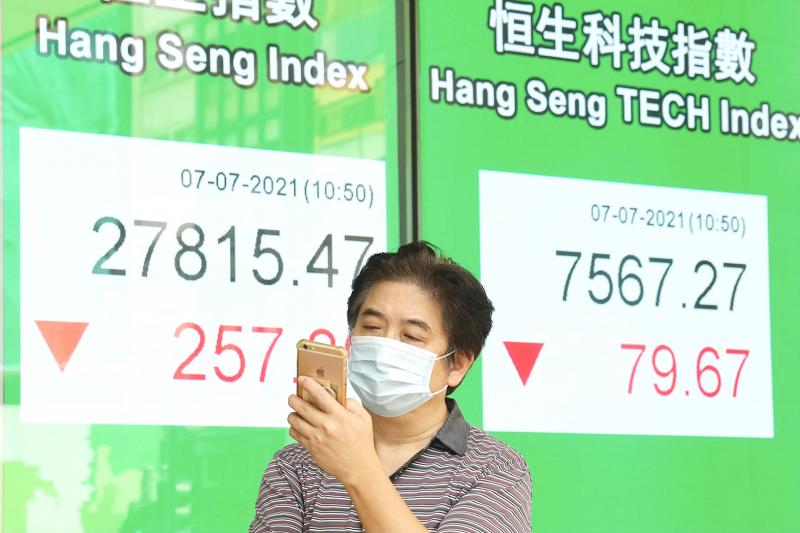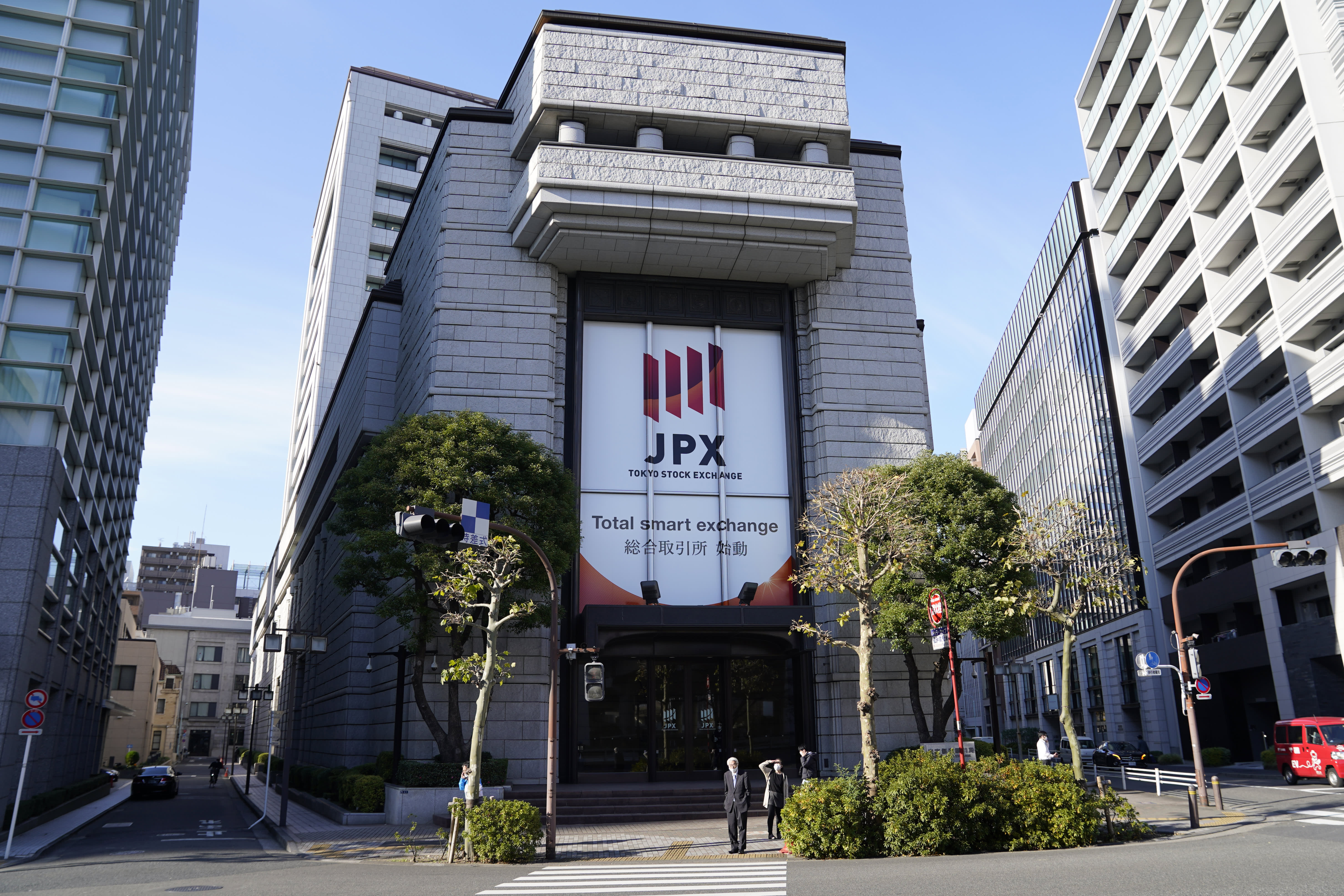恆生指數狂跌千點!傳美國限制基金投資,重創中港股債匯市
 ]
]
香港股市連日走跌,今日早盤開低後,恆生指數雖一度彈升 131 點,但由於賣壓沈重,午後下殺,終場狂跌 1105 點,跌幅 4.22%,勉強保住 25,000 點大關,《彭博社》報導,主因是一則未經證實的傳言,稱美國基金大舉拋售香港和中國資產,導致網路巨頭大跌,重創中港股市。
中國官方上週末宣布,將針對補教類上市公司、房地產市場及科技網路公司加強監管措施,導致包括互聯網、教育企業及房地產等行業股價大幅走跌,今日更在午後跳水,上證指數收跌 2.49%,報 3381.18 點;滬深 300 指數收跌 3.5%,恆生指數再狂跌千點,收盤跌 4.22%,報 25086 點。
港股整體表現疲弱,衝擊個股普遍走跌,阿里健康暴跌達 18%、美團跌 17%、恆騰網絡跌 16%、恆大汽車跌 16%、中國恆大跌 13%、京東物流跌幅超過 10%、恆大物業跌 10%、騰訊跌 8.9%、阿里巴巴跌 6.35%。
《彭博社》報導,由於未經證實的傳言稱美國基金正在拋售中國和香港資產,加劇中國和香港股市因北京監管打擊大跌,甚至有美國可能會限制在中國和香港投資的傳言,刺激新一輪拋售。
拋售蔓延至債券和貨幣市場,中國交易最活躍的 10 年期國債收益率上漲 7 個基點至 2.94%,為一年來最高,同期限國債期貨一度大跌 0.4%;離岸人民幣兌美元一度下跌 0.6% 至 6.52,自 4 月以來首次跌破 6.5。
國元證券交易與策略負責人李崑琨表示,今日市場廣泛流傳一則傳言,稱美國基金大舉拋售香港和中國資產,甚至可能會限制美國基金在香港和中國的投資,儘管傳言未經證實,但市場擔心外資將大舉從中國股債市場流出,情緒遭重創。
(首圖來源:pixabay)
Hang Seng index world’s biggest tech loser
 ]
]
Hang Seng index world’s biggest tech loser
Bloomberg
An index launched a year ago to give investors greater exposure to China’s Internet giants is now the world’s worst-performing major technology gauge.
The Hang Seng Tech Index has been on a roller-coaster ride in the past 12 months. The gauge, which marks its first anniversary on Tuesday, was up 59 percent at its February peak, but has since seen more than US$551 billion in market value wiped out amid Beijing’s clampdown on the sector.
That has reduced its gain to nearly 6 percent, compared with more than 40 percent for the MSCI World Information Technology Index and the NASDAQ-100 Index. The measure also lags onshore peers — the ChiNext Index is up 35 percent for the period.
A man walks past an electronic board showing the Hang Seng indices in Hong Kong on July 7. Photo: AP
The underperformance highlights regulatory risks for one of the fastest-growing sectors of China’s economy. Beijing’s bold moves to rein in the nation’s powerful tech firms, such as Jack Ma’s (馬雲) Ant Group Co (螞蟻集團) and Didi Global Inc (滴滴), have sent global investors fleeing on concerns over China’s tighter grips on data.
“The ongoing concern that medium-term earnings power may be dented by their data becoming more of a public good, and privacy becoming more of an issue, remains a headwind,” Robeco Hong Kong Ltd portfolio manager Joshua Crabb said.
Bank of America Corp strategists wrote in a note last week that the regulatory overhang is unlikely to dissipate any time soon, instead recommending investors to rotate into tech firms outside of China.
Launched last year, the gauge tracks the 30 largest Hong Kong-listed tech firms, including giants such as Tencent Holdings Ltd (騰訊), Alibaba Group Holding Ltd (阿里巴巴) and Meituan (美團). It was set in motion at a time when Chinese tech companies were looking to list closer to home as growing tensions between Washington and Beijing threatened to curtail access to US capital markets.
The index took a fresh beating this month — down 11 percent — after China ordered a ban on new users from downloading Didi’s app. Regulators are considering unprecedented penalties for the ride-hailing company following a controversial initial public offering, people familiar with matter have said.
While the forward price-to-earnings ratio for the Hang Seng Tech Index has slumped from a February peak, it is still trading at about 35 times estimated profits, compared with 28 times for the NASDAQ-100 Index and 43 times for the ChiNext, Bloomberg’s data show.
That has not deterred some. Hong Kong’s two most popular exchange-traded funds this year are those tracking the tech gauge. The combined total assets of all such ETFs have more than doubled in size this year to US$3.8 billion, and the pace of investment into the products has accelerated since mid-May.
“Some long-term institutions may have started buying these Hang Seng tech ETFs. It seems that the more the index falls, the more ETFs they will buy,” Zhongtai Financial International Ltd (中泰金融國際) analyst Alvin Ngan said.
While some see the uncertainty created by the ongoing crackdown as a buying opportunity, others remain wary amid questions over its duration and where it might head next.
Jian Shi Cortesi, a fund manager at GAM Investment Management in Zurich, said the bottom will not be seen until investors have seen the conclusion of tightening regulations.
Hong Kong’s Hang Seng ends Friday lower, posts 5% weekly loss after volatile trade
 ]
]
SINGAPORE — A week of volatile trading in Chinese markets has left Hong Kong’s Hang Seng index 5% lower.
Both Hong Kong and mainland-listed stocks fell on Friday, losing the partial recovery they made after diving earlier this week. Hong Kong’s Hang Seng index ended Friday off session lows, but still closed about 1.4% lower at 25,961.03.
Tech stocks fell, reversing from their Thursday gains. Alibaba tumbled around 4%, Tencent was down about 2.6%, and Meituan dived nearly 6%. The Hang Seng Tech index overall lost around 2.6%.
Mainland-listed stocks were also subdued. The CSI 300 tumbled 0.81% to 4,811.17, while the Shanghai composite declined 0.42% to 3,397.36 and the Shenzhen component was down 0.29% to 14,473.21.
The yuan, however, recovered strongly after selling off earlier this week, tracking the stock losses. The offshore yuan was at 6.4624 on Friday afternoon, after weakening to around 6.52 levels earlier this week.